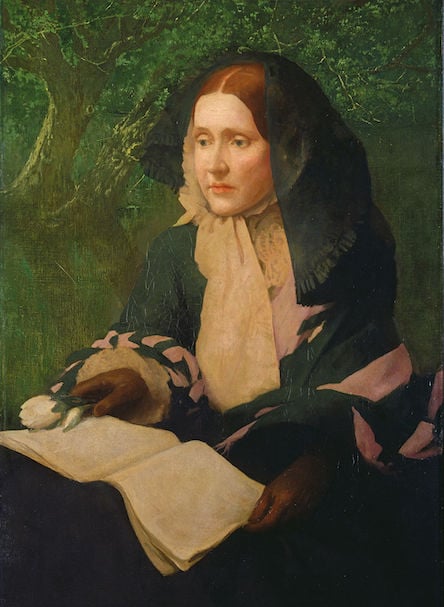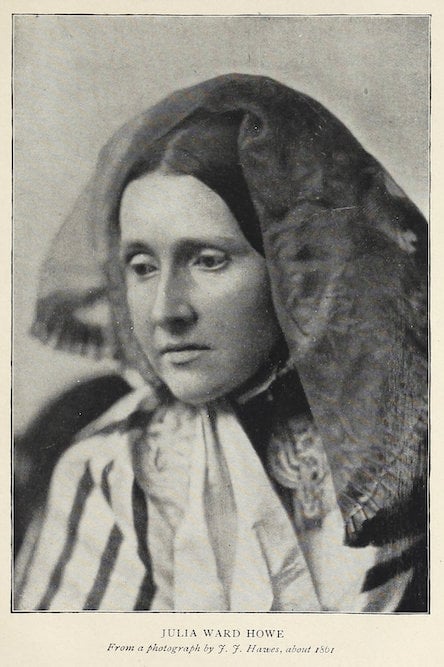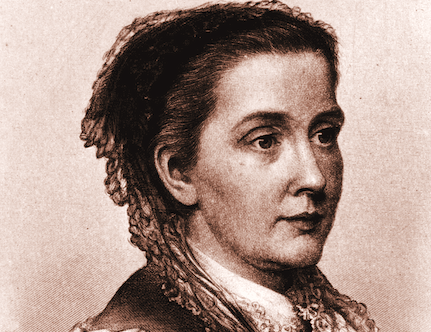10 Fascinating Facts about Julia Ward Howe
By Miki Pfeffer | On August 15, 2020 | Updated August 28, 2022 | Comments (2)

Julia Ward Howe (1819 – 1910) was an American poet, essayist, editor, speaker, and activist extraordinaire, especially in the causes of abolition, suffrage, and the advancement of women everywhere.
Although her iconic “Battle Hymn of the Republic” is ubiquitous in patriotic, inspirational, and popular settings, its author is far less known. Let’s look at 10 fascinating facts about the woman behind the verses.
Howe was born on Bond Street and Broadway in New York City to an affluent, Calvinist family; when she was five, her mother died in childbirth. She was educated in a home with its own library and art gallery and well-propertied for a secure future. Her heroic but controlling husband stymied her spirit and mishandled her land holdings.
Once Howe recovered her voice in the company of the New England Woman’s Club and Unitarianism, her mission became to free other women and gain the vote.
. . . . . . . . .

Portrait of Julia Ward Howe by John Elliot
. . . . . . . . .
Howe earned five dollars for the publication of “Battle Hymn”
“Battle of Hymn of the Republic” was first published in The Atlantic Monthly in February 1862.
Howe claimed that a minister friend goaded her to write new verses to the marching song “John Brown’s Body” as the two watched Union soldiers go by in Washington, D. C. Once her hymn became popular and was performed almost everywhere in the North, it provided celebrity and a platform for her causes.
She repeatedly told of how the verses came to her fully formed and that she had risen to write them in semi-darkness. She answered the many requests over her lifetime for handwritten verses to be used as fundraisers.
An early nickname tells her style
Suitors called her “Diva.” She expected esteem. She was undeterred once her mind was set.
Once, she charmed herself onto the caboose of a freight train when she missed the passenger one and needed to keep an engagement; she once hugged a post on a pitching ship to deliver an address she had promised. She could act the “belle” well into her sixties and was indefatigable into her ninety-first year. When she gave her support, she overcame obstacles with courage, wit, and benignity.
. . . . . . . . .

. . . . . . . . .
Her first volume of poetry was provocative for its time
Passion-Flowers (1853) was expressive in ways that seemed inappropriate during True Womanhood when piety, purity, and domesticity were expected, especially of married women.
The collection was published anonymously, but her husband, Samuel Gridley Howe, was blindsided by it and appalled by its intimacies. Longfellow and Margaret Fuller encouraged her poetry.
Housekeeping and motherhood were not her strong suits
She raised five children to adulthood (she lost one son at four) but always demanded “precious time” for study (“PT” to her children). Each pregnancy depressed her, and marriage and motherhood did not fulfill her.
Her husband judged her inept and hired consecutive housekeepers, some of whom were patients from the Perkins School for the Blind, which he founded.
When Samuel Gridley Howe died in 1876, his estate went to their offspring, not to Julia. Her eldest brother, Sam Ward, bought her the house on Beacon St. in Boston. In widowhood, she was most free to pursue her causes, but she worried she might leave debts for her children.
. . . . . . . . . .

. . . . . . . . . .
Leadership was her true calling
She was the perpetual president of the Association for the Advancement of Women and the New England Woman’s Club and an editor of its Woman’s Journal. She also helped edit her husband’s abolitionist paper, The Commonwealth.
She was a leader in the American Woman Suffrage Association, the state-centered movement for suffrage, and was active when that group merged with the federal push for a Constitutional amendment and became the NAWSA. The Nineteenth passed too late for Howe to vote.
She also called on mothers to demand world peace and envisioned a Mother’s Day for that purpose.
She promoted suffrage, equality, and “women’s work” when she went to the South
As president of the first Woman’s Department (white) at a World’s Fair in the South, Howe helped open minds to suffrage, as did visiting activists like Susan B. Anthony.
At the World’s Industrial and Cotton Centennial Exposition in New Orleans in 1884-85, she led women to consider higher education, new jobs, suffrage, and transitions in “women’s work.”
She met with representatives of the Colored Ladies Exposition Committee and spoke to audiences in the Colored Department and at two Black universities in New Orleans during her six-month stay. She heard her “Battle Hymn” played and sung at those events.
. . . . . . . . . .

. . . . . . . . . .
She brought literature and journalism to the Cotton Centennial Exposition
Howe tasked her youngest daughter to create a library in the Woman’s Department. Maud Howe amassed over a thousand books, magazines, and newspapers written or edited by women, and she donated 800 books to a circulating library in New Orleans at the end of the fair.
Howe invited a hundred women of the press to cover the fair and the Woman’s Department.
While in the city, she revived a lagging literary club (the Pan Gnostics) and helped members to research, write, present, edit, and publish their works. At least one woman’s career began in that club — Grace King— and other careers were advanced under her leadership.
. . . . . . . . .

You might also enjoy: A New Orleans Author in Mark Twain’s Court
Letters from Grace King’s New England Sojourns by Miki Pfeffer
. . . . . . . . . .
There was nothing small about her but her size
The redhead was less than five feet tall, but her ambition, determination, wit, and accomplishments were outsized. She arranged her own engagements all over the country and was still trying to do so into her ninety-first year. In forty-four years of journals (lodged in Houghton at Harvard), she logged worries, triumphs, and whereabouts and with-whom.
She could draw a crowd as large as Emerson’s when she lectured
Like Ralph Waldo Emerson, Howe spoke at Bronson Alcott’s School of Philosophy in Concord, Mass. The building is behind Orchard House, where Louisa May Alcott wrote Little Women and other popular books.
. . . . . . . . . .
 . . . . . . . . . .
. . . . . . . . . .
The life story of Julia Ward Howe won the first Pulitzer award for biography in 1917
Julia Ward Howe, 1819-1910 by daughters Laura E. Richards and Maud Howe Elliott, assisted by Florence Howe Hall, won that first prize for biography, autobiography, or memoir. In 1899, Howe had published her Reminiscences 1819–1899 and also wrote the biography, Margaret Fuller (Marchesa Ossoli) in 1883.
Contributed by Miki Pfeffer, who received the 2015 Eudora Welty Prize for Southern Ladies and Suffragists: Julia Ward Howe and Women’s Rights in the 1884 New Orleans World Fair. Miki is a visiting scholar at Nicholls State University and also the author of A New Orleans Author in Mark Twain’s Court: Letters from Grace King’s New England Sojourns.
Sources
- Howe, Julia Ward. Reminiscences 1819-1899. Reprinted New York: Negro Universities Press, 1969.
- Pfeffer, Miki. Southern Ladies and Suffragists: Julia Ward Howe and Women’s Rights in the 1884 New Orleans World Fair. Jackson: University Press of Mississippi, 2015
- Richards, Laura E. and Maud Howe Elliott. Julia Ward Howe 1819-1910. Boston: Houghton Mifflin, 1915.
- Showalter, Elaine. The Civil Wars of Julia Ward Howe: A Biography. New York: Simon & Schuster, 2017.
- Williams, Gary. Hungry Heart: The Literary Emergence of Julia Ward Howe. Amherst: University of Massachusetts Press, 1999.
- Ziegler, Valerie. Diva Julia: The Public Romance and Private Agony of Julia Ward Howe. Harrisburg, PA: Trinity Press, 2003.
Excellent research and commentary on Mrs. J. W. Howe. Dr. M. Pfeffer never disappoints her audience.
Thank you, Judy; I agree!